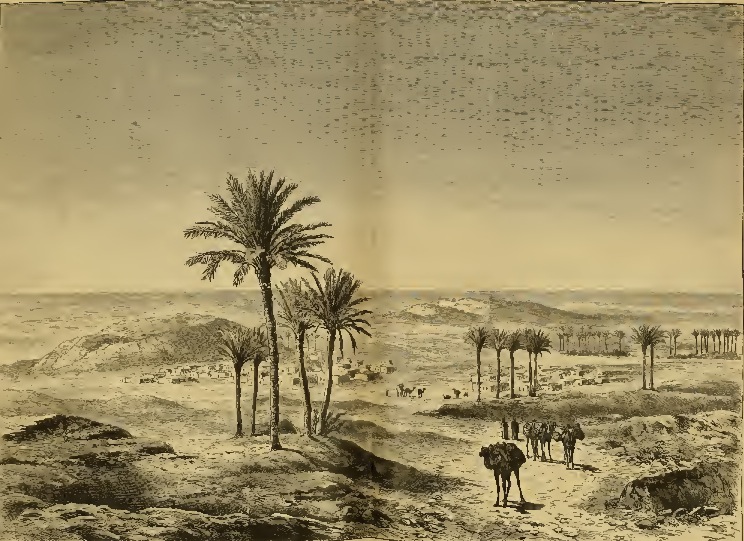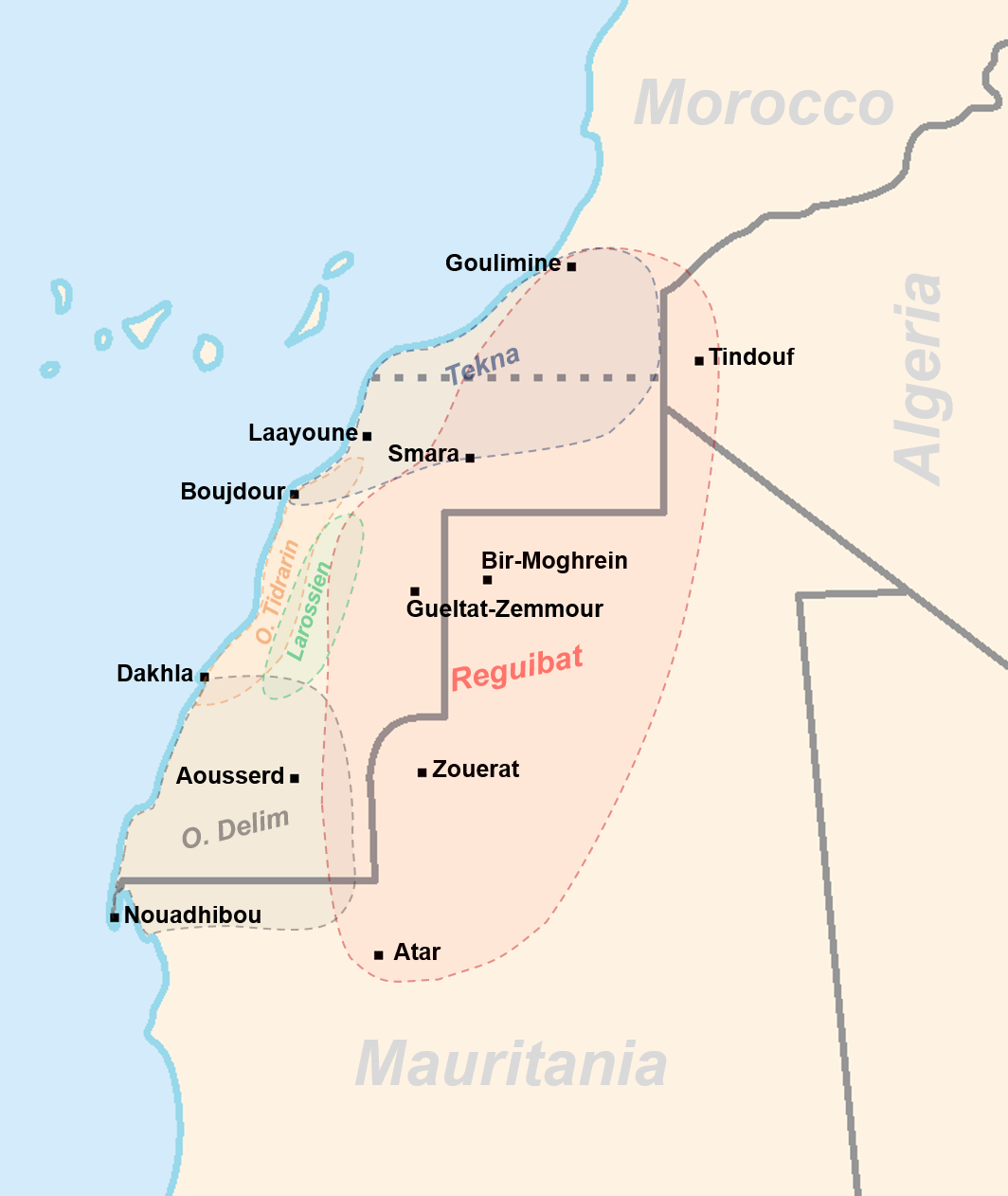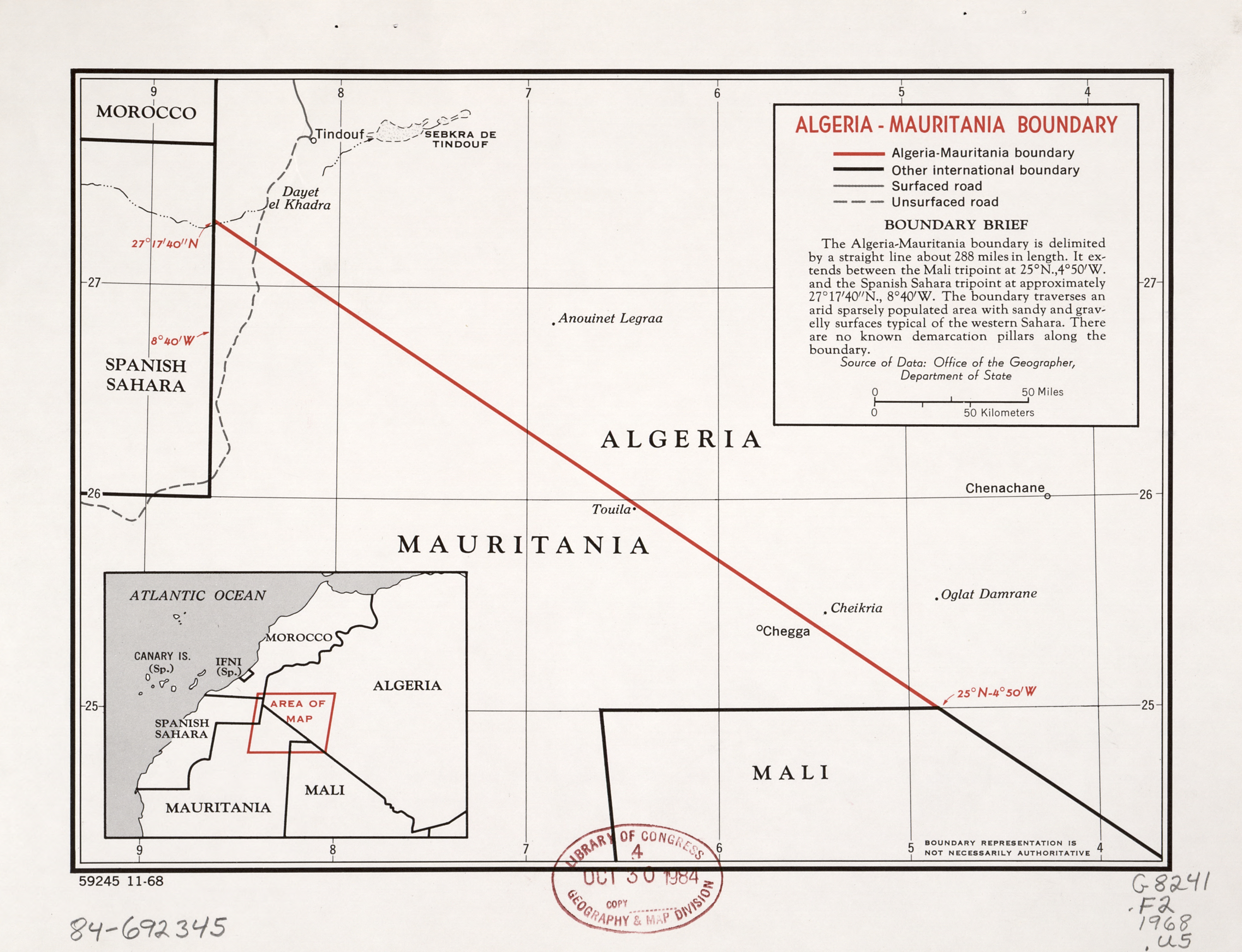|
Tindouf
Tindouf ( Berber: Tinduf, ar, تندوف) is the main town, and a commune in Tindouf Province, Algeria, close to the Mauritanian, Western Saharan and Moroccan borders. The commune has population of around 160,000 but the census and population estimates do not count the Sahrawi refugees making the population as of the 2008 census 45,966, up from 25,266 in 1998, and an annual population growth rate of 6.3%. The region is considered of strategic significance. It houses Algerian military bases and an airport with regular flights to Algiers as well as to other domestic destinations. The settlement of Garet Djebilet lies within the municipal territory of Tindouf near the border with Mauritania; the settlement has an iron mine and a defunct airport, and is approximately northwest of Âouinet Bel Egrâ. Since 1975, it also contains several Sahrawi refugee camps operated by the Polisario Front, a national liberation movement seeking the self-determination of Western Sahara. Histo ... [...More Info...] [...Related Items...] OR: [Wikipedia] [Google] [Baidu] |
Sahrawi Refugee Camps
The Sahrawi refugee camps (also romanized with Saharawi) in Tindouf, Algeria, are a collection of refugee camps set up in the Tindouf Province, Algeria in 1975–76 for Sahrawi refugees fleeing from Moroccan forces, who advanced through Western Sahara during the Western Sahara War. With most of the original refugees still living in the camps, the situation is among the most protracted in the world. The limited opportunities for self-reliance in the harsh desert environment have forced the refugees to rely on international humanitarian assistance for their survival. However, the Tindouf camps differ from the majority of refugee camps in the level of self-organization. Most affairs and camp life organization are run by the refugees themselves, with little outside interference. The camps are divided into five (districts) named after towns in Western Sahara; Laayoune (El-Aaiún), Awserd, Smara, Dakhla and more recently Cape Bojador (or the daira of Bojador). In addition, there i ... [...More Info...] [...Related Items...] OR: [Wikipedia] [Google] [Baidu] |
Western Sahara
Western Sahara ( '; ; ) is a disputed territory on the northwest coast and in the Maghreb region of North and West Africa. About 20% of the territory is controlled by the self-proclaimed Sahrawi Arab Democratic Republic (SADR), while the remaining 80% of the territory is military occupation, occupied and administered by neighboring Morocco. Its surface area amounts to . It is one of the List of sovereign states and dependent territories by population density, most sparsely populated territories in the world, mainly consisting of desert flatlands. The population is estimated at just over 500,000, of which nearly 40% live in Laayoune, the largest city in Western Sahara. Occupied by Spain until 1975, Western Sahara has been on the United Nations list of non-self-governing territories since 1963 after a Moroccan demand. It is the most populous territory on that list, and by far the largest in area. In 1965, the United Nations General Assembly adopted its first resolution on Wes ... [...More Info...] [...Related Items...] OR: [Wikipedia] [Google] [Baidu] |
Sahrawi People
The Sahrawi, or Saharawi people ( ar, صحراويون '; es, Saharaui), are an ethnic group and nation native to the western part of the Sahara desert, which includes the Western Sahara, southern Morocco, much of Mauritania, and along the southwestern border of Algeria. They are of mixed Berber, Arab and Black African descent. As with most peoples living in the Sahara, the Sahrawi culture is a mix of Arab and indigenous African elements. The modern Sahrawi culture consists of a Berber core and considerable Arab influences. Sahrawis are composed of many tribes and are largely speakers of the Hassaniya dialect of Arabic. Etymology The Arabic word ' literally means "Inhabitant of the Desert". The word Sahrawi is derived from the Arabic word ' (), meaning desert. A man is called a "Sahrawi", and a woman is called a "Sahrawiya". In other languages it is pronounced in similar or different ways: * Berber: ''Aseḥrawi'' or ''Aneẓrofan'' * English: ''Sahrawi'' or ''Sahar ... [...More Info...] [...Related Items...] OR: [Wikipedia] [Google] [Baidu] |
Âouinet Bel Egrâ
Âouinet Bel Egrâ (also known as Aouinet Bélagraa) is a village in the commune of Tindouf, in Tindouf Province, Algeria. It is in the Sahara Desert approximately 160 kilometres south-east of Tindouf Tindouf ( Berber: Tinduf, ar, تندوف) is the main town, and a commune in Tindouf Province, Algeria, close to the Mauritanian, Western Saharan and Moroccan borders. The commune has population of around 160,000 but the census and population .... There is a Saharawi Refugee camp here named Dakhla. References Neighbouring towns and cities Populated places in Tindouf Province {{Tindouf-geo-stub ... [...More Info...] [...Related Items...] OR: [Wikipedia] [Google] [Baidu] |
Garet Djebilet
Garet Djebilet (also written Gâra Djebilet) is a settlement in the commune of Tindouf, in Tindouf Province, Algeria. The village is located southeast of Tindouf near the Mauritanian border, and is the location of an iron mine Iron ores are rocks and minerals from which metallic iron can be economically extracted. The ores are usually rich in iron oxides and vary in color from dark grey, bright yellow, or deep purple to rusty red. The iron is usually found in the f .... References Neighbouring towns and cities Populated places in Tindouf Province {{Tindouf-geo-stub ... [...More Info...] [...Related Items...] OR: [Wikipedia] [Google] [Baidu] |
Tindouf Airport
Commandant Ferradj Airport is an airport in Tindouf, Algeria . Airlines and destinations Statistics References OurAirports - Tindouf Airports in Algeria Buildings and structures in Tindouf Province {{Algeria-airport-stub ... [...More Info...] [...Related Items...] OR: [Wikipedia] [Google] [Baidu] |
Polisario Front
The Polisario Front, Frente Polisario, Frelisario or simply Polisario, from the Spanish abbreviation of (Popular Front for the Liberation of Saguia el-Hamra and Río de Oro), (in ar, rtl=yes, الجبهة الشعبية لتحرير الساقية الحمراء ووادي الذهب, al-Jabhah al-Shaʿbiyah Li-Taḥrīr as-Sāqiyah al-Ḥamrāʾ wa Wādī al-Dhahab), is a rebel Sahrawi nationalist liberation movement claiming Western Sahara. Tracing its origin to a Sahrawi nationalist organization known as the Movement for the Liberation of Saguia el Hamra and Wadi el Dhahab, the Polisario Front was formally constituted in 1973 with the intention of launching an armed struggle against the Spanish occupation which lasted until 1975, when the Spanish decided to allow Mauritania and Morocco to partition and occupy the territory. The Polisario Front waged a war to drive out the two armies. It forced Mauritania to relinquish its claim over Western Sahara in 1979 and continu ... [...More Info...] [...Related Items...] OR: [Wikipedia] [Google] [Baidu] |
Provinces Of Algeria
Algeria, since December 18, 2019, is divided into 58 wilaya, wilayas (province, provinces). Prior to December 18, 2019, there were 48 provinces. The 58 provinces are divided into 1,541 baladiyahs (Municipalities of Algeria, municipalities). The name of a province is always that of its capital city. According to the Algerian constitution, a wilaya is a territorial collectivity enjoying economic and diplomatic freedom, the APW, or ''"Popular Provincial Parliament/Provincial Popular Parliament"'' (the ''Assemblée Populaire Wilayale'', in French) is the political entity governing a province, directed by the "Wali (administrative title), Wali" (Governor), who is chosen by the Algerian President to handle the APW's decisions, the APW has also a president, who is elected by the members of the APW, which Algerians elect. List By 1984 the number of Algerian provinces were fixed at 48 and established the list of municipalities or "communes" attached to each province. In 2019, 10 new pr ... [...More Info...] [...Related Items...] OR: [Wikipedia] [Google] [Baidu] |
Tajakant
The Tajakant (also Tadjakant) is a Sahrawi tribe of Berber Sanhaja origins. They speak Hassaniya Arabic. The Tajakant mainly live in Mauritania, Morocco, Western Sahara, Algeria, and Mali. They are Muslims, adhering to the Maliki school of Sunni Islam. The Tajakant tribe descended from the tribe of Lamtuna, a fraction of the powerful tribe of Sanhadja in the Mauritanian Adrar. They became sedentary during the ninth century, at the fall of the Almoravid empire and founded two cities, Tinigui and Togba, located between Chinguetti and Ouadane, but since disappeared. The Tajakant were known as traders and warriors, and held a strong position in the trans- Saharan trade between ''Belad Asudan'' (Sub-Saharan Africa) and Morocco. In 1852, Tajakant tribesmen founded a settlement and trading post in the oasis of Tindouf, in what is now Algeria. They were engaged in a lengthy war against the Reguibat and Kunta in the 19thc., their allies in this war were the Senhaja. This culminated i ... [...More Info...] [...Related Items...] OR: [Wikipedia] [Google] [Baidu] |
Communes Of Algeria ...
The municipalities of Algeria (Arabic: بلدية (singular)) form the third level of administrative subdivisions of Algeria. As of 2002, there were 1,541 municipalities in the country. List This list is a copy from the Statoids page named Municipalities of Algeria'. The population data is from June 25, 1998. References See also * List of cities in Algeria * Cities of present-day nations and states {{DEFAULTSORT:Communes Of Algeria Subdivisions of Algeria Algeria 3 Communes, Algeria Communes An intentional community is a voluntary residential community which is designed to have a high degree of social cohesion and teamwork from the start. The members of an intentional community typically hold a common social, political, relig ... [...More Info...] [...Related Items...] OR: [Wikipedia] [Google] [Baidu] |
Algeria–Mauritania Border
The Algeria–Mauritania border is 460 km (286 m) in length and runs from the tripoint A tripoint, trijunction, triple point, or tri-border area is a geographical point at which the boundaries of three countries or subnational entities meet. There are 175 international tripoints as of 2020. Nearly half are situated in rivers, l ... with Western Sahara in the west to the tripoint with Mali in the east. Description The border consists of a single straight line orientated NW-SE connecting the Western Saharan and Malian tripoints. It runs through a remote, scarcely populated stretch of the Sahara desert. History France had French conquest of Algeria, conquered most of northern Algeria during the period 1830-47, incorporating it as an integral part of France. The 1880s saw an intense competition between the European powers for territories in Africa, a process known as the Scramble for Africa. This culminated in the Berlin Conference of 1884, in which the European nations co ... [...More Info...] [...Related Items...] OR: [Wikipedia] [Google] [Baidu] |
Algeria–Western Sahara Border
The Algeria–Western Sahara border is 41 km (26 mi) in length and runs from the tripoint with Morocco in the north to the tripoint with Mauritania in the south. Description The border consists of relatively short north–south straight line running through the Sahara desert connecting the Moroccan and Mauritanian tripoints. History France occupied much of the northern coastal areas of Algeria in the period 1830–47, which had hitherto been subject to the nominal control of the Ottoman Empire. The border emerged during the 'Scramble for Africa', a period of intense competition between European powers in the later 19th century for territory and influence in Africa. The process culminated in the Berlin Conference of 1884, in which the European nations concerned agreed upon their respective territorial claims and the rules of engagements going forward. As a result of this process, Spain announced its intention to declare a protectorate over the north-west African coast between ... [...More Info...] [...Related Items...] OR: [Wikipedia] [Google] [Baidu] |





